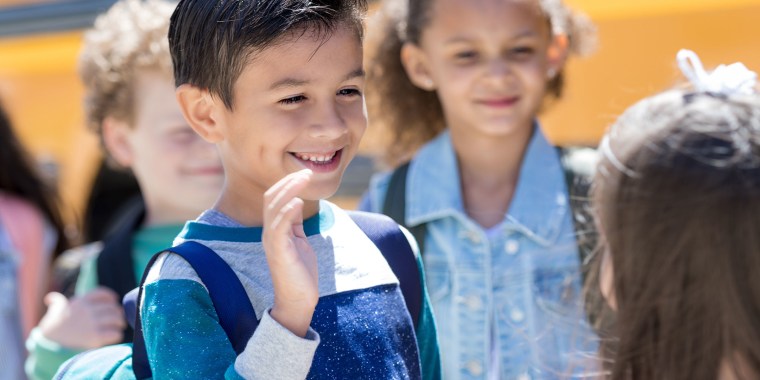A recent study co-authored by Vanderbilt University professor Stephen Elliott found that basic social skills such as taking turns, listening, and being kind are important to children’s academic success. Elliot’s research discovered that increasing children’s social skills makes them better at learning, and that cooperation and self-control can help reduce problem behaviors. Politeness and respect are skills that you should teach your child from an early age, as this will help her become more socially aware and will help her better manage her relationships. The ability to do nice things for others, listen and stay calm, follow steps and rules, and take turns when talking will help your child be successful in social interactions.
Ask your child to practice being polite with you and others. Teach her to say “please” and “thank you.” Compliment her on using the right words and tone of voice when she asks for a snack or makes polite requests, and acknowledge her when she helps others. If your child does something wrong or inappropriate in a social setting, remember to make it a proactive lesson. Take her aside to talk to her about her behavior later, not in the heat of the moment, as children do not like to be scolded in public when something goes wrong.
Write thank-you cards with your child. New York City-based teacher Anne Harlam says that doing this can help your child understand the importance of saying “thank you” when someone else does something special for her. When you write out the thank-you cards for her, your child misses the wonderful lesson about how good manners make everyone involved feel good.
Express gratitude to your child. Say “thank you” and acknowledge her efforts, which makes your child feel appreciated and respected and may make her want to respect others as well. For example, if your child is able to sit calmly for a long time in the car, even more effective than saying “great job” would be, “Thank you so much for being calm for so long! You made it much easier for me to follow these difficult directions!” This way you are not only modeling good manners to your child but also making her feel appreciated and valued because she did something to help you.
Set a good example. You can teach by example when you thank a friend for taking care of your dog when you’re away from home, or when you tell a store clerk “have a nice day” after checking out. Explain how and why you’ve used your words and tone of voice. Your child will mimic your behavior, and if you are disrespectful, she will copy you. You can’t assume that she will pick up etiquette entirely on her own, and if you describe specific ways to be respectful, this will help her better-understand these concepts.
Parent Toolkit resources were developed by NBC News Learn with the help of subject-matter experts, including Faye de Muyshondt, socialsklz:-) for SUCCESS and Anne Morrison, Pre-Kindergarten Teacher, Lycée Français de New York.
